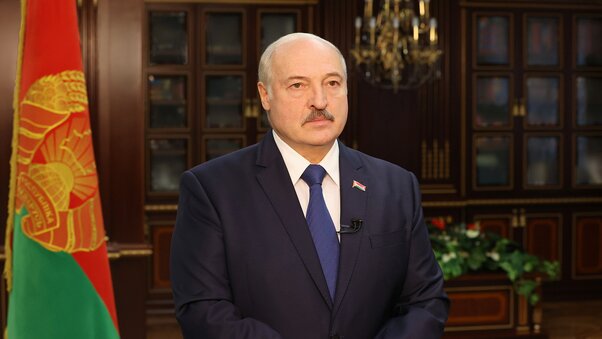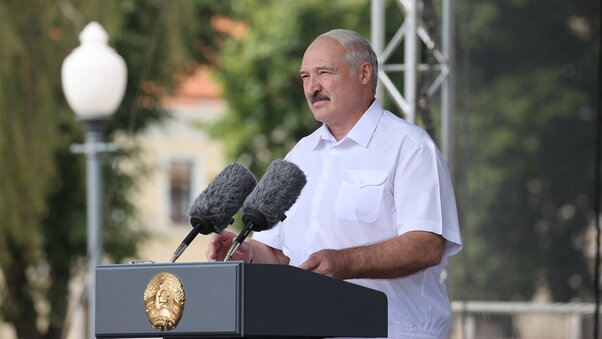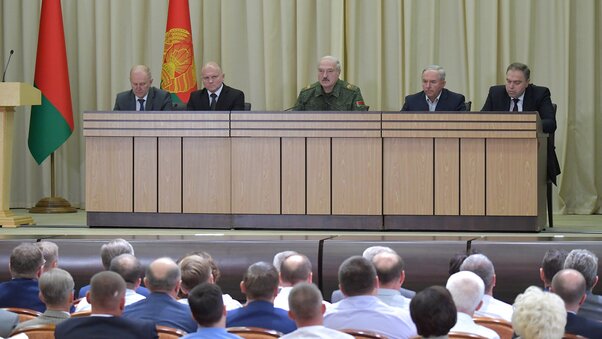Visit to Belarusian nuclear power plant
- 44
- 6
Belarus President Aleksandr Lukashenko made a working trip to Ostrovets District where he visited the Belarusian nuclear power plant on 7 November.
"Is the area of the construction and maintenance site larger than the plant itself? I had the impression that it is almost twice as large," the President said. Energy Minister Viktor Karankevich informed that 130 different buildings and structures have been constructed on the territory of more than 100 hectares. "With the launch of the first unit, 88 facilities will be commissioned, with the launch of the second one - 42," he explained.
In the BelNPP training center the President was informed about the work to commission the plant and its integration into the country's economy. "Everything is so casual and routine as if we have built the metro. This is the historic moment. The country has become a nuclear power," the head of state said.
According to Viktor Karankevich, the Belarusian nuclear power plant will produce about 18 billion kWh annually. The launch of the nuclear power plant will allow the country to replace about 4.5 billion cubic meters of natural gas per year. The currency burden on the budget will be reduced by more than $500 million. Greenhouse gas emissions will be decreased by more than 7 million tonnes per year. “The lifespan of the plant is 60 years with the possibility of extension to 100 years," the minister added. In total, more than 2,500 specialists will work at the Belarusian nuclear power plant, about 60 of them - specialists from Russia and Ukraine with the experience of working at nuclear power plants.
Aleksandr Lukashenko discussed the prospects of cooperation with Russia in nuclear energy with Director General of the Russian state nuclear industry corporation Rosatom Aleksei Likhachev. The head of state proposed to set up a subsidiary of the Russian state corporation in Belarus. The possible construction of additional units at the Belarusian nuclear power plant and the launch of energy-intensive manufactures in the region were also touched upon. In addition, Rosatom, together with the Kurchatov Institute, offered the National Academy of Sciences to create a research reactor. "We actively support this project," said Aleksei Likhachev.
The launch of the nuclear power plant will open up new opportunities for the national economy and will allow Belarus to develop other sectors such as electric transport. However, it is important to create our own battery, Aleksandr Lukashenko said. The National Academy of Sciences has long working on this project. "We have made great progress. We should cooperate with Russia here too,” the President suggested. "As soon as we design our own battery for electric vehicles we will fully switch to electric traction, ahead of other countries."
Among the priorities is the conversion of the housing stock to electricity for heating and hot water. "I have made all necessary decisions - we are now switching housing to electricity. We have adopted the appropriate program," the President noted.
At the end of his visit to the Belarusian nuclear power plant, Aleksandr Lukashenko told reporters that he has a dream of building another nuclear power plant in the country. "Before we start building it, Belarusians will make absolutely sure that we have done the right job," he said.
According to the head of state, they try to persuade Belarusians that the NPP in Ostrovets is unsafe. But, as the President noted, the country is surrounded by nuclear power plants in other countries, and they are not as advanced as the Belarusian one. "It's just envy and competition," Aleksandr Lukashenko explained. “These neighbors are 10 years behind us in NPP construction. We're ahead of them, and they should admit it. They also have their achievements, we envy them but do not interfere."
The President noted that the construction of the nuclear power plant spurred the development of other sectors, especially the construction industry and the building materials sector. It will also push the development of environmentally friendly modes of transport, will give the country an opportunity to save on the consumption of natural gas. "Many large sectors of the economy are moving forward. We have invested almost $7 billion in our economy. If we decide to build the second plant, this will be a good stimulus for the development of the economy, a locomotive that will create momentum for many sectors of the economy," the head of state said.
Belarusian specialists have also learned many competencies as Russian partners shared their experience and technologies.
"If we calculate all this, we can already say that it is very beneficial. Especially at a time when the world has lost its mind over coronavirus," the President added.






































































































